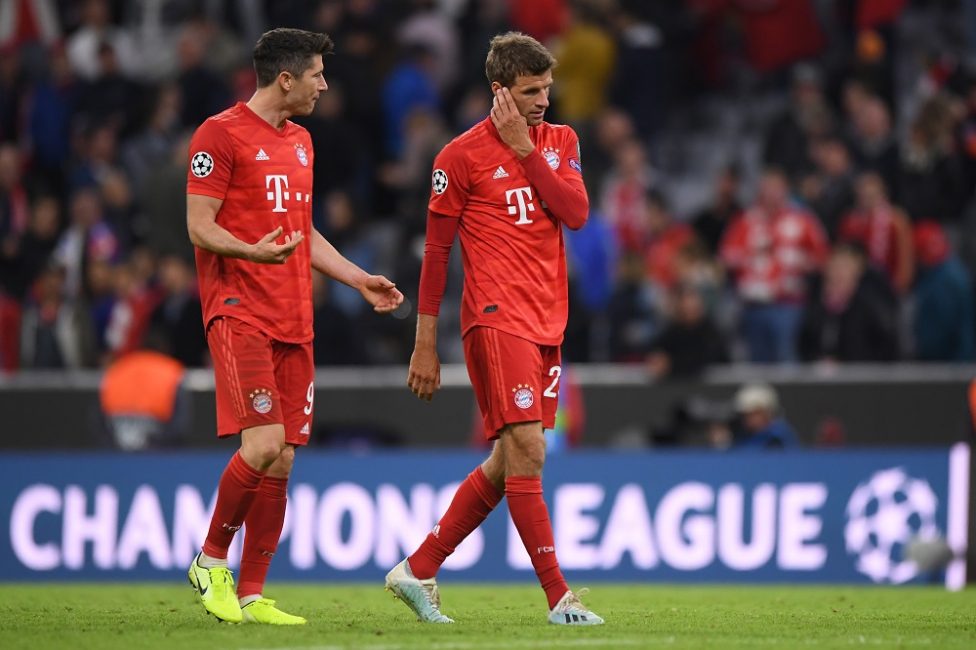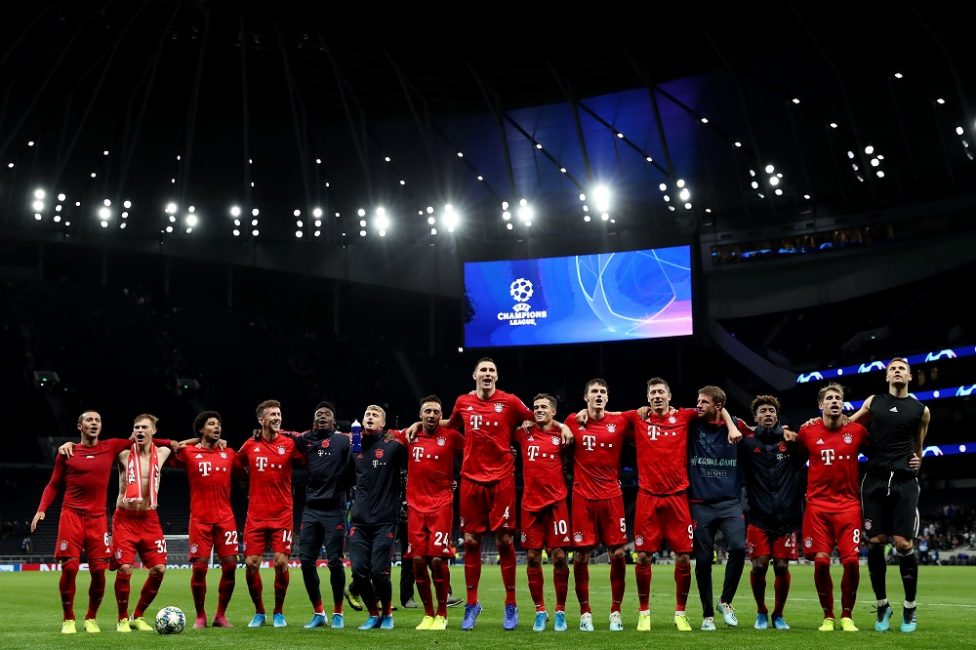Mailbag Roundtable: October 2019
Question 1
Our first question comes from @Onecheedo on twitter. “What do you think happened to the 4-3-3 that was used so much in the preseason? Did the arrival of Coutinho more or less kill that idea?”
Alex: It seems that way. However, I do not consider this a problem per se (if I am not mistaken in detecting a tinge of regret in the reader’s question). No formation, no system, no tactics in football is an end in and of itself. Every formation is only as useful as it is suitable for the players who are meant to play in it. Coutinho had a stellar time at Liverpool, where he mainly played as an advanced central playmaker, followed by a disappointing year at Barcelona where he was often used as the left winger in a 4-3-3 or as the outer left midfielder in a 4-4-2. Arguably, neither of these positions was ideal for him and so he failed to live up to the huge expectations that not least his achievements at Liverpool had given rise to. If as FC Bayern you have the opportunity to sign this player and do, it seems logical that you would do your utmost to get as much out of him as possible – including a change of formation given how strongly the quality of his performances has varied with his tactical position on the field in the past. If Coutinho is only able to exercise his manifold substantial skills to their fullest as the central playmaker – by all means, use a formation that has him play there! (E.g. Kovač’s preferred 4-2-3-1.)
There is maybe another upside to the fact that the current Bayern squad still has fresh memories of how to play in a 4-3-3 formation from their preseason preparations that might come a bit out of left field: if Coutinho gets injured or Kovač decides to give him a rest for a game or two, Bayern can smoothly revert from a 4-2-3-1 to a 4-3-3 in a heartbeat without needing much time for getting used to it again. They have both the practice and the players to do so (e.g. Müller and Tolisso as the number eights behind Lewandowski with two out of Perišić, Coman, and Gnabry on the wings).

(Image: Christian Kaspar-Bartke/Bongarts/Getty Images)
Daniel: I think it’s a mix between the instability in defense and the arrival of Coutinho. Last season the 4-3-3 ultimately failed because Bayern’s defensive midfield was deserted. There seemed to be gaping holes between the attacking midfield and the centre-backs. So Kovač not only reverted back to Heynckes’ 4-2-3-1 but often times chose to field and out and out destroyer with Javi Martínez.
While he hasn’t done so this season, the reasoning is quite similar. The games against Hertha Berlin, Schalke and the opening 30 minutes of the Mainz game showed the defensive midfield being overrun numerous times and the holding midfielder being isolated. Then, Coutinho being fit for the first time against Mainz gave Kovač a good reason to change Bayern’s formation without people thinking it’s because his initial plan didn’t work.
I also think a big factor for the 4-3-3 failing were the players at his disposal. In the summer Kovač surely thought he had Thiago as the number 6, 3 box-to-box midfielders with Goretzka, Tolisso and Sanches and Müller, a player who interprets the number 8 role so freely that he’s basically a 2nd striker alongside Lewandowski. Plus, Kovač surely expected more wingers and a defensive midfielder to sign, thus a 4-3-3 just made perfect sense.
Pre-season was one thing, but the reality of the situation was unfortunately different. No defensive midfielder was signed, but an attacking one who hasn’t exactly made a name for himself with his pressing skills. The bigger problem however, was the box-to-box midfielders. Sanches was sold and Goretzka injured making Tolisso the only player of this type available who incidentally isn’t having the best of seasons after his season-long injury. I very much believe it’s for Tolisso and Goretzka being out of form or unavailable and Pavard performing very well that Kovač started playing Kimmich in midfield, who’s not the number 6 Thiago is (yet?) and needs even more defensive help than the Spaniard does. Thus, ever since the cooling break against Mainz Bayern was playing a 4-2-3-1.
Once Goretzka and/or Tolisso are back at peak-fitness and in a condition where you really can’t bench them both, I can see Kimmich returning to right-back and Kovač switching back to 4-3-3. An athletic box-to-box midfielder just makes more sense as the link between attack and defense than creative minds like Thiago and Kimmich do.
Marc: Both Alex and Daniel made good points. The preseason is a completely different animal and our team had a very different complexion in the middle of the pitch for those games. As Daniel alluded to Bayern had, and still have to some degree, a surplus of box to box midfielders. With the sale of Sanches, injury to Goretzka and form of Tolisso, that has severely limited the options available and therefore required the use of a 10. As Daniel also pointed out, with the instability of the defense, playing a double pivot just makes sense.
One thing to keep in mind though is the fluidity of formations these days. Nearly every team plays a multitude of formations every game depending on possession, the opposition and flow of the game. Both Coutinho and Müller are not completely incapable defensively and will at least put in effort on that side of the ball. When Goretzka and Tolisso are back in form, I would expect that we’ll see a 4-3-3 on occasion, especially in the Bundesliga but I suspect that the 4-2-3-1 will be the formation of choice against better squads.
Question 2
Our second question comes from @me_unplugged20 on twitter. “What are your opinion on the current situation with Thomas Müller?“
Alex: It’s complicated. Superficially, the situation seems simple. The Thomas Müller of today is a far cry from the Thomas Müller of the period between 2010 and 2014, when he was not just someone who “always plays” under Louis van Gaal, but also one of the celebrated German young guns whose uninhibited, fresh, and energetic style of play for club and country wooed spectators around the world. These times, alas, are long gone. Not long after the 2014 World Cup, he more or less over night lost almost everything that had made him so outstanding a player: his goal threat, his unpredictability, his uncanny ability to always take the right decision, his ability to create danger out of nothing. I do not know why, but his performance took a sudden plunge from which it has never really recovered. Today, you would have to call him a little bit above okay-ish offensive midfielder who has his moments, but is far away from a player on whom the fate of a club like FC Bayern should depend in their clashes with Europe’s elite opposition.
Against this backdrop, it seems only logical that the arrival of Philippe Coutinho has almost instantly relegated Müller to the bench. Both players play in similar positions and vie for a very similar role in Kovač’s tactics. Philippe Coutinho is an expensive world star with a lot of promise and the ability to single handedly transform Bayern’s game through the centre, and Thomas Müller is the Thomas Müller described above. I am not the least bit surprised that Niko Kovač has been consistently preferring Coutinho to Müller since he has become match fit again.
So far, so straightforward – or, rather, not. Because at Bayern, Thomas Müller is not just any player. He is Bayern through and through. Müller may be the last remaining representative of the generation of homegrown Bayern players around Schweinsteiger and Lahm. He is dearly loved by the fans, especially among hard core Bayern supporters, and he enjoys a fair deal of goodwill from the local media. So every confrontation of Kovač with Müller, be it directly through unfortunate statements to the media or indirectly by not playing him, receives a lot of attention and spells trouble for the coach – even though he only does his job and plays the players who he believes will deliver him the best return.
All of this taken together seems like a perfect recipe for trouble and a fair bit of dissonance at Bayern and portends an uneasy time for Niko Kovač in the weeks and months ahead. One thing, however, seems certain: we have not heard the last of this. Watch this space.
Daniel: Thus far, Thomas Müller’s career can largely be divided into two parts. The first one is him bursting onto the scene, becoming Bayern’s go-to second best goalscorer virtually every season and being such an important linchpin in attack that Jupp Heynckes was playing him over Robben on right-wing. Part two starts with Guardiola’s departure. I don’t think Müller lost his mojo after the 2014 World Cup, his two subsequent seasons are just way too good for that insinuation, but I largely agree with Alex’ outline for the time after his dreaded penalty miss against Atlético.
To put it bluntly, Thomas Müller just isn’t as good a player as he was before. Just looking at the most simple statistic in football shows a clear dip in his career. From scoring an average of 21.6 goals a season in all competitions to not reaching double digits twice in the past three seasons. Sure, his assists went up a bit, but not to a point where it evens out his overall scoring points.
Also (and this might be more of a subjective thing) but Müller was really once the definition of a big-game player. His main contributions weren’t even his impressive numbers but on which occasion he did score. He stepped up when crunch-time came. Scoring in cup-finals, in Champions League semi finals and even in the final. He has more goals in the Champions League than Agüero, Eto’o or Rooney and he’s not even a centre-forward! If you want to broaden the scope to the national team, when the world cup started he was a beast unleashed. This isn’t the case anymore. So last season when people were talking about Lewandowski or Thiago underperforming, for me, he was the worst player in both Real Madrid ties in the last three seasons.

(Image: Sebastian Widmann/Bongarts/Getty Images)
People have been saying “Müller will be fine”, even here in this outlet. I must say, it’s been over three years and I for one don’t see him being fine. He’s had three consecutive bad to okayish seasons with two horrible national team tournaments in between and hasn’t been exactly great this season either. That’s not good enough. That’s not enough for being a starter at Bayern and that’s not good enough for being the 3rd highest earner in the club. Right now, being number 13 or 14 in the squad is exactly where he should be. And if he doesn’t reach the consistent highs he has had years before and he’s not content with being a top-joker, then he sadly has to leave.
This isn’t 2017 anymore. Him being benched won’t get a coach sacked anymore. It’s not just one lackluster season and one lackluster tournament with Germany.
That being said, Kovač’s statement before the Hoffenheim game was a mistake and needless fodder for the press. I also think he should’ve just played Müller (and Martínez for that matter) in that game. Kovač rotated too much in his first half-season and rotated not enough in his second half-season which resulted in him losing the trust of a number of players. He must find a middle ground between these two extremes.
Marc: I agree with Daniel that Müller’s decline really started during Ancelotti’s tenure though that is hardly the point. I think there are a combination of factors at play in his decline. First of all age is undefeated. As players get older, they either find ways to adjust their games and succeed or they start a massive decline. Given that he was never the most physically talented player in the world, I think the slight declines he has experienced have had an even more dramatic affect on his overall play.
Second, since Guardiola left, the systems and styles used have not really matched up with how he likes to play, with the exception of the half season under Jupp. Both Kovac and Ancelotti wanted to play a 4-3-3, and while both ended up switching back to a 4-2-3-1, at least on paper, the style of play has never really suited Müller since.
Lastly, I think that a significant part of his issues are a result of a lack of confidence. The mental side of all athletics is extremely important and from my observations, he is definitely struggling. He has become passive in the extreme. Four years ago when he received a ball around the box, it was 50/50 whether he would shoot or pass it on. Now, it seems as if he always passes, even if it isn’t the best option. Even if he is wide open.
The complication is the fact that he is clearly a club legend and he’s only 30 years old. Those two factors have given him extra leeway where others may have been under more pressure. His age especially makes you think that under the right situation there’s a chance that he turns it around. However, I like Daniel, am not convinced that this is the case, especially at Bayern. This team needs a world class playmaker in the middle and the facts are that Coutinho is a significantly better option than Müller at this point. I just hope that if the result is a separation between Müller and Bayern, that it doesn’t turn ugly. He deserves to go out as gracefully as possible given his status.
Question 3
The Champions League victory against Tottenham in London certainly made noise. However, that game was immediately followed by a slip up at home to Hoffenheim. Which game is more telling to you, the away victory or the home defeat?
Alex: I think it is the combination of both performances because it highlights what has been so typical of Bayern’s game in recent years in all its stark contrast. Most certainly, the game against Tottenham was a field day for Bayern. I think we are all agreed that the game was exceptional in many ways. After the first 30 minutes, Bayern could not have complained if they had fallen behind by two or three goals whereas in the second half, they scored at will with almost more goals than chances. The result was a freakish 2-7 that will probably never happen again quite like this.
What the game demonstrated to me, however, despite its exceptionality, was what Bayern is able to do in the way of creating and converting chances when luck, ability, and desire coincide.
Against Hoffenheim just a few days later, Bayern was back to its old self that we know so well from recent years. They played okay, even quite well at times, especially in the first half, created chances but failed to score. There was a lack of concentration and precision in their actions and nothing was left of the clinical finishing they had had on display just a few days earlier against Tottenham. Bayern’s game was a typical mix of a post-high slump and an overdose of conviction that everything would work out well eventually (the opponent was only Hoffenheim after all).
We have seen Bayern play games like that against Hoffenheim with far too much regularity in recent years. However, we have also seen the kind of focused and clinical performance they delivered in the second half against Tottenham in so called “big games” every now and then (consider the 5-0 against Dortmund last year, several recent games against Leipzig in league and cup, and even the 0-0 draw against Liverpool in the Champions League last year).

(Image: Catherine Ivill/Getty Images)
What is so telling about this is that we become fully aware of what Bayern _can_ do if they put their minds to it and mean business. Alas, probably since Guardiola left they have put on far too many ‘Hoffenheim performances’ where they have failed to live up to their potential and left their supporters in despair over the casualness of their actions.
To be fair, most times even the most casual performance will be sufficient for Bayern to beat their run off the mill Bundesliga opposition. But be it for a dearth of serious competition in the league or the stark discrepancy between a clash in the Champions League in front of a worldwide audience first, and a bread and butter game against a bottom-third competitor in the league just a few days later, something seems to make it difficult for Bayern to flip the switch when needed and stay focused, even though we know they are capable of that. If the human psyche could be trained like a muscle or a specific pattern of movement – which regrettably in many ways it cannot – the area of mental resilience, determination, and ability to focus at will would be something I would advise the coaching team to address. It is the realisation of how important the mental side is in football, how difficult it is to work on it, and the deficiencies Bayern obviously still have in this department taken together that make the combination of both games so telling to me.
Daniel: It’s a bit of both with more of Tottenham than Hoffenheim for me. So maybe a ⅔ vs ⅓ split? I mean let’s face it: Nobody really doubts if Bayern can do it on a lukewarm afternoon at the Allianz. But people have grown to doubt if they can do it on a cold rainy night in London. (Was it cold and rainy? Ah, it probably was, it’s London after all…)
So Bayern lost to Hoffenheim. Yup, that’s not good. Shouldn’t happen again. But will anybody make a big issue out of it? I doubt it. Nobody is going to say that Bayern just doesn’t cut it anymore in the Bundesliga, something people were actually saying about Bayern’s place in the Champions League and the greater context of European top clubs in general.
Granted, the Hoffenheim defeat is now the second slip-up against rather mediocre Bundesliga-competition at home which is unusual at this stage of the season, but to me it’s still more telling that Lewandowski silenced his critics. That Gnabry showed he’s more than just a good Bundesliga-player. That Thiago performs well and is vital for the team. That Manuel Neuer is still Manuel Neuer.
The Tottenham game was a total freak-game, sure, but Bayern wasn’t gifted these goals. I still don’t know how Bayern scored against Liverpool in March, but I can pinpoint exactly what went right for each goal in London. After years of people and press smugly telling Bayern’s players just aren’t good enough (anymore), I feel the individual quality displayed against Tottenham is a very welcome boost of confidence for the entire club.
Marc: Obviously there is a bit of both as the other have alluded to. I however am going to take the more negative view. While the result of the Tottenham game was exceptional and obviously turned into a rout, there were still quite a few issues on display in the first 50 minutes. Once Gnabry scored his two goals, things became much more simple for Bayern. Tottenham got one back but even then eventually turned to an extremely offensive setup at the expense of the defense. The result was a complete thrashing.
As Daniel said, the individual quality on display in this game was encouraging and showed that Bayern still has the talent to compete at the highest level. The first goal by Kimmich and second by Lewandowski for instance were amazing individual efforts that came from nothing. While these were fantastic goals, it’s not something that you can replicate or rely on. The last three were against a team that had literally no back line. In other words, and as crazy as it sounds, the build-up and creative play in attack were still largely missing in this game despite the 7 goals.
All of this is not to say that I think Bayern are bad. Far from it actually. I think the talent that is on the field is actually higher than many, especially in the media, give Bayern credit for. However, the inconsistencies shown throughout this season, and last season for that matter, are something that is concerning to me. Bayern’s ability to find that consistency will likely determine how successful they ultimately are this season.












[…] [EN] Mailbag Roundtable: October 2019 | Marc […]